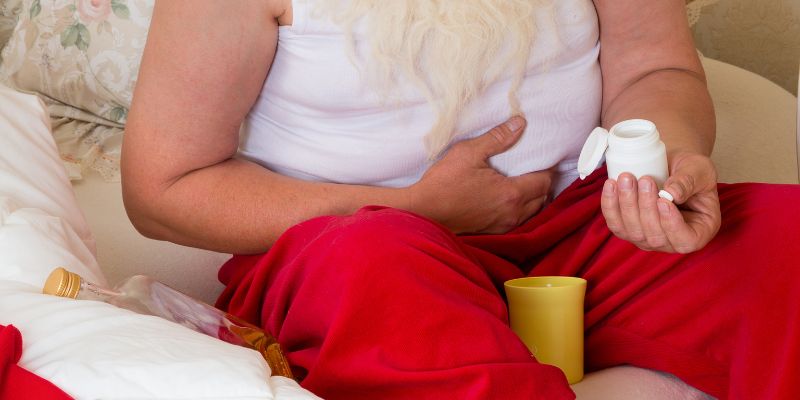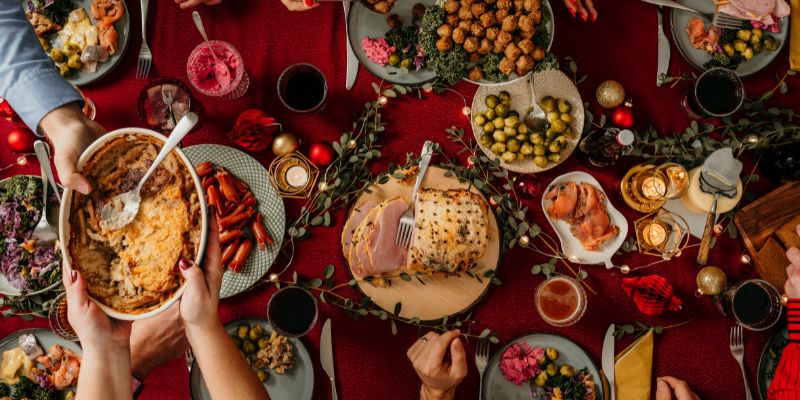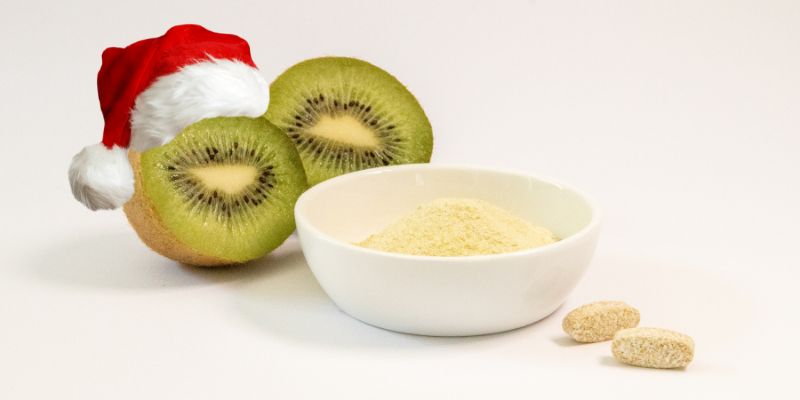‘Tis the season to be….bloated!

As the festive season rolls around again, work Christmas functions and gatherings with family and friends to celebrate the holiday season bring with them an abundance of food, drink and that inevitable feeling like you are about to burst. That’s right, bloating. The horrible sensation many of us experience when we’ve overindulged or eaten the wrong type of food.
For the most part, bloating over the holidays comes down to the volume of food and drink consumed – we simply eat too much. However, the types of food consumed at this time of year also have an impact. Bloating can occur when digestion slows down, excess gas is produced and/or our gut microbiome is out of balance.
The types of foods that can do these things include those commonly eaten over the holidays such as:
- Fatty foods – Fat slows down digestion in your stomach, delaying gastric emptying so you feel full and potentially bloated.
- High protein foods – like fats, proteins are complex and some take longer to digest, staying in your stomach for longer making you feel the need to undo a button or notch on your belt.
- Salty foods – high salt (sodium) intake can make the body retain water, giving you that bloated and puffy feeling.
- Simple carbs and sugar alcohols – these belong to the group of carbohydrates called FODMAPs which are easily and rapidly fermented by bacteria in your gut. This can cause a rapid build-up of gas leading to bloating.
- Alcoholic beverages – those beverages which are carbonated are an obvious cause of bloating by introducing gas into your gut, but alcohol itself can also disturb your gut microbiome. An imbalance in your gut microbes can make you more prone to bloating as you may have less of the bacteria that absorb gasses and/or more bacteria that produce a lot of gas.
On top of this, eating quickly and while having a chat, can also cause bloating as you swallow more air.

How to avoid that dreaded bloated feeling
On those festive days, there are some things you can do to help avoid bloating.
Avoid your trigger foods
If you suffer from IBS, or know there are some foods that make you more bloated than others, then try your best to avoid those trigger foods. For some it might be white carbohydrates like potato and pasta, for others it may be the FODMAPs which include foods like dairy, apples, onions, garlic, cabbage, cauliflower and those that contain artificial sweeteners.
Eat slowly
Chewing properly and eating slowly not only helps get your digestion process started by physically breaking down food into manageable pieces, it also reduces the amount of air that is swallowed. Another bonus is that it gives your body time to signal that it is full, helping to avoid overeating.
Balance it out
Piling your plate high with rich fatty foods, carbs and meat probably sounds appealing, but aim to replace some of that meat covered in gravy and potato with lashings of butter with some greens and complex carbohydrates – your belly will thank you for it.
Hydrate!
Drinking plenty of water will help to keep you full (so you won’t feel like eating more) and can curb your alcohol intake. If you are wanting to enjoy a few alcoholic beverages, try having a glass of water between each alcoholic drink. Steering clear or minimising the number of carbonated beverages may help too. Consider swapping them for water with lemon or ginger for an added digestive boost.
The extra water will also help to flush out any excess salt consumed and avoid that salt bloat.
Opt for smaller, more frequent meals, rather than one big one
As you sit down to Christmas lunch or dinner, do your best to try and stop when you are full and before you get overfull! Better yet, rather than having one massive meal, eat smaller amounts more often to spread out the food intake and give your digestive system time to process the food. Alternatively, put a moderate amount of food on your plate to start with – you can always go back for seconds.
How to get rid of bloating
If, despite your best efforts, you do overindulge (and let’s face it, most of us will) and need to get rid of that bloated puku, here are some things to try:
Go for a post-feast walk
You might feel like lounging on the couch in your trackies (sweatpants), but a gentle walk around the block will encourage digestion and get things moving along.
Get cosy with a hot water bottle
Probably not a go-to for those of us in the Southern Hemisphere as we enjoy a hot, summertime Christmas, but in the north, cuddling a hot water bottle can soothe a bloated tummy and keep you warm.
Go natural
Follow up your meal with a digestive tea, such as ginger or peppermint, or if you can handle it, chew on some fresh ginger or fennel seeds.
Another natural remedy that may also help to relieve or reduce bloating is naturally FODMAP-friendly New Zealand green kiwifruit powder, Actazin®. Actazin with its multiple key bioactives supports digestive health through various mechanisms:
- Actinidin, a proteolytic enzyme naturally found in green kiwifruit, enhances the digestion of proteins in the stomach and increases the rate of stomach emptying. This helps reduce the feeling of fullness, bloating and discomfort after a protein-rich meal. Perfect for digesting all that turkey and ham.
- Clinical studies have shown that Actazin improves bowel regularity, providing relief from constipation, and supporting gut motility to keep things moving along.
- Actazin contains a good level of potassium which can also help to balance out the sodium levels in the body to relieve bloating from excess salt.
- Actazin’s complex kiwifruit dietary fibre is slowly fermented by the good gut bacteria along the length of the colon. This means any gas produced is spread out and in amounts that can be readily dealt with by other bacteria, diffusion through tissue, or from being closer to the exit.



